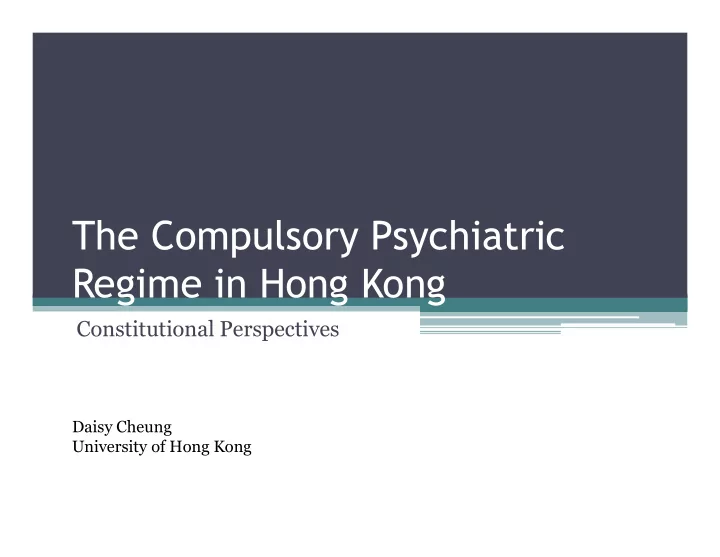

The Compulsory Psychiatric Regime in Hong Kong Constitutional Perspectives Daisy Cheung University of Hong Kong
Background • Mental Health Ordinance (Cap. 136) (“MHO”) ▫ Enacted in 1960 ▫ Last major amendment in 1997
Roadmap • Compulsory admission and treatment regime (the “ compulsory regime ”) • Role of the District Judge • Suggestions for reform
The civil compulsory regime • Sections 31, 32 and 36 of the MHO ▫ Section 31: Detention of a patient under observation ▫ Section 32: Extension of period of detention of a patient under observation ▫ Section 36: Detention of certified patients
▫ Section 36: If- (a) a patient liable to be detained in a mental hospital (otherwise than under this section) or in the Correctional Services Department Psychiatric Centre; or (b) a voluntary patient in a mental hospital, has been examined by 2 registered medical practitioners either separately or together and the 2 registered medical practitioners are of the opinion that- (i) the patient is suffering from mental disorder of a nature or degree which makes it appropriate for him to receive medical treatment in hospital; and (Amended 81 of 1997 s. 28) (ii) it is necessary for the health or safety of the patient or for the protection of other persons that he should receive such treatment and it cannot be provided unless he is detained under this section, they may complete a certificate in the prescribed form and forward it to a District Judge.
• Treatment • Duration of stay • Case review ▫ Mental Health Review Tribunal
Section 59D(1) • Whenever a patient (other than a voluntary patient) or his relative does not exercise his right to apply to the tribunal under section 59B(1) for a period of 12 months after the right first became available to him — • (a) the medical superintendent, if the patient is liable to be detained in a mental hospital; or • (b) the Commissioner of Correctional Services, where the patient is liable to be detained in the Correctional Services Department Psychiatric Centre, • shall, at the expiration of the period for making the application, refer the patient’s case to the tribunal.
Section 59B(1) • An application may be made to the tribunal for the review of the case of any patient liable to be detained in a mental hospital or the Correctional Services Department Psychiatric Centre; but nothing in this section shall apply to any person who is serving a sentence of imprisonment in pursuance of the order of any court during the period within which he is liable to be detained in pursuance of that sentence other than a person detained at the discretion of the Chief Executive.
Section 59B(5) • Except with the leave of the tribunal, no application may be made under subsection (1) or (2)— • (a) • by a patient liable to be detained under a hospital order or transfer order, within a period of 12 months after he is first liable to be so detained; or • (b) • within 12 months of the determination of a previous review unless it is for the purpose of reviewing any direction or decision of the medical superintendent under this Ordinance which could not have been considered at the previous review.
Role of the District Judge • Countersigning certificate ▫ If a District Judge who has received a certificate in accordance with subsection (1) is satisfied that the certificate referred to in subsection (1) is in order and there are no grounds for rejecting it, he shall countersign the certificate and shall forward it to the medical superintendent of the mental hospital in which the person is detained (section 36(2))
Role of the District Judge • Case law ▫ Re Patient O District Judge refused to countersign Generally: Not enough information about the patient No provision for District Judge to ask to see the patient Specifically: No alleged aggressive behavior during stay in Castle Peak
• Hospital Authority v A District Judge • Hospital Authority challenged District Judge’s decision not to countersign by way of judicial review • Hartmann J: • Section 59 provides mechanism for regular consideration of patient’s release (BUT only once if patient does not apply) • District Judge not allowed to question medical validity of an opinion if it was submitted in compliance with the relevant section of the Ordinance • Content: succinct diagnosis and recommendation, without more, would be sufficient
Constitutional rights in question • Right to freedom and liberty ▫ Article 28 of the Basic Law ▫ Article 5 of the Bill of Rights • Permissibility of restrictions ▫ General test of proportionality which courts apply in all rights-based cases regardless of instrument and whether qualified or absolute
Proportionality • Legitimate purpose • Rational connection • No more than necessary ▫ Reasonable necessity/minimal impairment • Reasonable balance between societal benefits and restriction of rights
What is the problem? • Problem 1 ▫ Abuse Caregivers Medical practitioners
Solutions (1) • Quick fix ▫ Reading a discretion for District Judges in s.36 MHO “If a District Judge who has received a certificate in accordance with subsection (1) is satisfied that the certificate referred to in subsection (1) is in order and there are no grounds for rejecting it , he shall countersign the certificate and shall forward it to the medical superintendent of the mental hospital in which the person is detained.” Require doctors to give sufficient reason so District Judges can have more of a substantive role – not just a rubber stamp ▫ Piecemeal legislative reform Non-exhaustive list of factors
What is the problem? • Problem 2 ▫ Holistic view of the patient’s needs ▫ Importance of other professional perspectives
Solutions (2) • Long term solution - overhaul ▫ UK regime AMHP – mix of professional perspectives Safeguards (ss 57, 58, 58A Mental Health Act) SOADs Duration of stay
Conclusions • Constitutional challenge • Overhaul of the mental health regime in Hong Kong
Thank you!
Recommend
More recommend